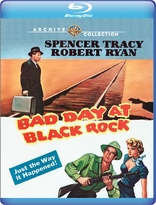Bad Day at Black Rock Blu-ray Movie
HomeBad Day at Black Rock Blu-ray Movie 
Warner Archive CollectionWarner Bros. | 1955 | 82 min | Not rated | Jan 17, 2017
Movie rating
7.7 | / 10 |
Blu-ray rating
| Users | 4.5 | |
| Reviewer | 4.5 | |
| Overall | 4.5 |
Overview
Bad Day at Black Rock (1955)
A one-armed stranger comes to a small town shortly after WWII in pursuit of a Japanese farmer.
Starring: Spencer Tracy, Robert Ryan (I), Anne Francis, Dean Jagger (I), Walter BrennanDirector: John Sturges
| Western | Uncertain |
| Crime | Uncertain |
| Drama | Uncertain |
Specifications
Video
Video codec: MPEG-4 AVC
Video resolution: 1080p
Aspect ratio: 2.55:1
Original aspect ratio: 2.55:1
Audio
English: DTS-HD Master Audio 2.0 (48kHz, 24-bit)
Subtitles
English SDH
Discs
Blu-ray Disc
Single disc (1 BD)
Playback
Region free
Review
Rating summary
| Movie | 5.0 | |
| Video | 5.0 | |
| Audio | 4.5 | |
| Extras | 2.5 | |
| Overall | 4.5 |
Bad Day at Black Rock Blu-ray Movie Review
Stranger in Town
Reviewed by Michael Reuben February 15, 2017Director John Sturges is best remembered for iconic Westerns
(The Magnificent Seven, Gunfight
at the O.K. Corral) and epic tales of wartime heroism (The Great Escape, The Eagle Has Landed), but his first major success combined elements from both genres in the unlikely guise of
a film noir. Bad Day at Block Rock was one of many pet projects of producer Dore Schary, who
had established his credibility with Battleground
and, by 1951, found himself installed as the
new head of MGM. Even from that lofty position, Schary had trouble getting Black Rock made,
largely because the screenplay by Millard Kaufman (adapted from a short story in a magazine)
didn't seem to have much substance to it. Spencer Tracy, whom Schary wanted for the lead,
thought the film was beneath him, and the original director, Richard Brooks, pronounced the
screenplay "a piece of sh*t". It took Sturges to grasp the material's potential. Having spent his
apprenticeship directing low-budget "B" pictures for Columbia and MGM, he could appreciate
the story's spare elegance, and his relationship with Tracy from their previous collaboration on
The People Against O'Hara helped smooth over the
veteran actor's concerns. With Sturges at the
helm, Black Rock jumped from a standstill to the fast track. Production was completed over a
two-month period in the summer of 1954, and the film premiered in January of the following
year.
In both form and content, Black Rock was groundbreaking. It was among the first MGM features to be shot in
CinemaScope, and Sturges reveled in the format's ability to showcase the mountainous landscape
of Lone Pine, California, and the isolation of the decrepit town built there for the production.
Black Rock was also the first studio film to acknowledge the forced relocation and internment of
Japanese-Americans during World War II, which was still so much a hot-button issue in 1955
that MGM's president worried that the film was "subversive". Despite these concerns, MGM
released Black Rock to acclaim, profitable box office and Oscar nominations for Kaufman's
screenplay, Sturges' direction and Tracy's lead performance. The film's title became a
catchphrase for a day of reckoning.
The Warner Archive Collection has added Bad Day at Black Rock to its Blu-ray catalog in a
sterling new transfer that should bring renewed attention to what John Sturges declared to be his
personal favorite among his films.
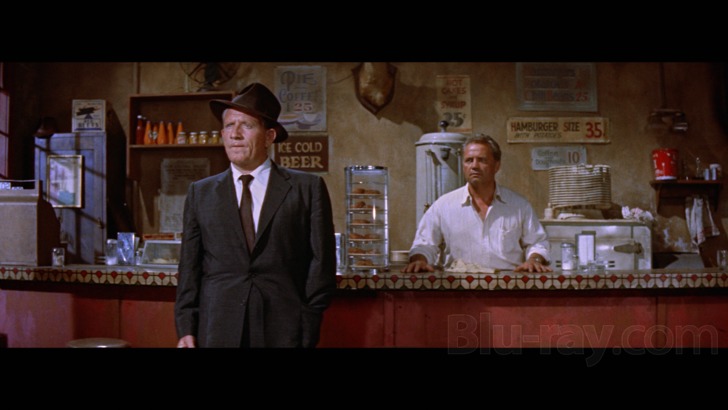
A stranger who comes to town unaware that he is entering a world of trouble is a well-established Western trope. (Think of Shane or A Fistful of Dollars.) Black Rock transports this familiar formula to the 20th Century. In 1945, a few months after the end of World War II, a Streamliner train streaks across the desert until it pulls into the station at Black Rock, where it hasn't stopped in years. A lone stranger disembarks: an older man with an ordinary appearance, except that he keeps his left hand tucked in his pocket because that arm is maimed and useless. The stranger's name is John J. Macreedy, and he is looking for a farmer named Komoko, whom he expects to find in a nearby area called Adobe Flat. The very mention of these names makes townspeople nervous. Eventually Macreedy is told that Komoko, a Japanese-American, was shipped to a relocation camp shortly after Pearl Harbor, and he never returned.
But even before Macreedy announces the purpose of his visit, his reception in Black Rock is a pungent mixture of fear and hostility. The telegraph operator at the train station, Hastings (Russell Collins), insists that Macreedy must be there by mistake. When he tries to check into the local hotel, a flustered clerk, Pete Wirth (John Ericson), offers flimsy excuses about why he can't rent a room. After overcoming Pete's objections, Macreedy finds his room invaded by a bullying cowboy, Hector David (Lee Marvin), who suggests that he move on. Wherever the stranger goes, he is stonewalled, gawked at, threatened. Everything about the town suggests that it's hiding a guilty secret (which it is).
The ruler of this rickety kingdom is Reno Smith (Robert Ryan), an imperious rancher who barks orders and expects them to be followed. His chief enforcer is the burly Coley Trimble (Ernest Borgnine). Everyone else in the town's scant population is either too scared or too old to stand up to Reno. (The Streamliner conductor aptly describes their appearance as "woebegone and faraway".) Sheriff Tim Horn (Dean Jagger) has disappeared into a whiskey bottle and uses his own jail cell to sleep off his benders. Doc Velie (Walter Brennan), who serves the town as both healer and mortician, has the haunted air of someone who is burdened by guilt but who long ago gave up trying to do something about it (or, as he puts it, "I'm consumed by apathy"). The only woman visible on the scene is Liz Wirth (Anne Francis), sister of the hotel clerk, who owns the local gas station and auto repair shop. Liz makes the mistake of renting Macreedy her jeep to drive to Adobe Flat, which immediately earns her the wrath of Reno Smith. "This is liable to be the hardest ten dollars you ever earned in your life", he says ominously. Meanwhile, Reno has Hastings tapping out telegraphed inquiries about Macreedy's background, trying to learn whatever he can about this unwelcome visitor who seems impervious to intimidation.
There is never any doubt that the steely-eyed Macreedy and the tyrannical Smith are locked on a collision course, and Sturges' efficient direction marches them toward their showdown with the inevitability of the ticking clocks in High Noon. Kaufman's script is studded with sharply pointed exchanges that add to the sense of impending doom. It's the kind of articulate verbal fencing that one would expect from Sam Spade or Philip Marlowe:
Smith: My name is Smith. I own the Three Bar Ranch. I want to apologize for some of the people in town.
Macreedy: Act like they're sitting on a keg.
Smith: A keg? Of what?
Macreedy: (laughs) I don't know. Diamonds? Gunpowder?
Smith: Oh, it's nothing like that. We're suspicious of strangers is all. Hangover from the old days, the Old West.
Macreedy: I thought the tradition of the Old West was hospitality.
Smith: I'm trying to be hospitable, Mr. Macreedy.
Despite Spencer Tracy's initial reservations, Macreedy is one of his finest creations, a seemingly average man whose very stillness and self-possession make him a rare creature in a town where most of the population is so accustomed to being bullied that they accept it as routine. As the townspeople discover Macreedy's purpose, and Komoko's true fate is revealed, Black Rock's dilapidated surface is peeled back to reveal the moral rot beneath. "The rule of law has left here and the gorillas have taken over", says Macreedy in disgust. By the time he's finished, one can't say for sure whether the rule of law has returned, but at least some measure of justice has been done.
Bad Day at Black Rock Blu-ray Movie, Video Quality 
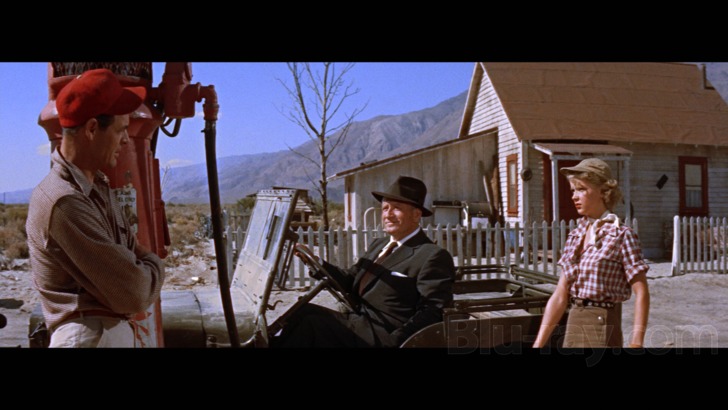
Bad Day at Black Rock was shot by William C. Mellor (Love in the Afternoon) in one of MGM's first
uses of what was then a new-fangled widescreen format called CinemaScope. Mellor and director
Sturges composed their shots expansively, taking full advantage of the wider frame. In scene
after scene, they array multiple characters across the screen, situate adversaries at opposite ends
and accentuate the town's isolation against the background of the desert and distant mountains.
For this 1080p, AVC-encoded Blu-ray from the Warner Archive Collection, a newly created
interpositive has been scanned at 2K by Warner's Motion Picture Imaging facility, followed by
extensive color-correction and cleanup. The result is a superb re-creation of the film's original
photography, with remarkable sharpness and detail and a finely resolved and naturally rendered
grain pattern. Black Rock's palette is dusty and faded, dominated by soft earth tones with just an
occasional intrusion of bright color for contrast (e.g., the red of the Streamliner train or the
turquoise blouse worn by Liz Wirth when she drives Macreedy out of town at night). Blacks are
solid and steady, which is especially crucial for the film's climactic nighttime showdown
between Macreedy and Reno Smith. WAC has mastered the film at its usual high bitrate (here,
just under 35 Mbps), with a capable encode to ensure an image free of artifacts. The Blu-ray
image is almost certainly superior to what most audiences saw on release prints in 1955, and it
deserves highest marks for its accuracy.
Bad Day at Black Rock Blu-ray Movie, Audio Quality 
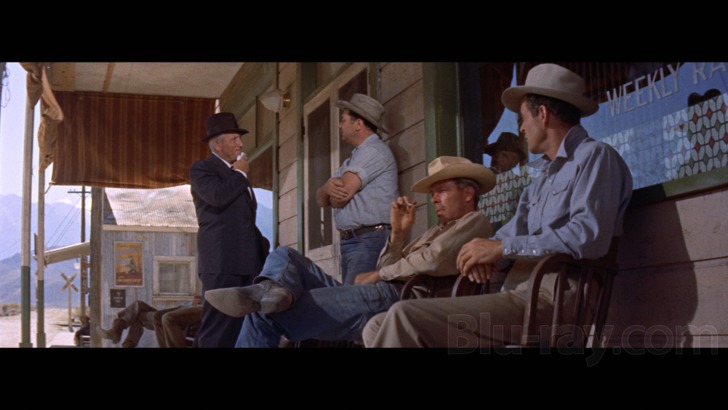
Bad Day at Black Rock was released to theaters in both mono and four-track stereo. The latter has been used for Blu-ray, with the four tracks folded down into a 2.0 mix encoded in lossless DTS-HD MA 2.0. The sense of stereo separation is most noticeable in the musical score by André Previn (It's Always Fair Weather), which is alternately adventurous and suspenseful, with an occasional dash of military flair. Even though Sturges had reservations about the music, especially in the film's opening, which he initially envisioned as almost silent, Previn's compositions are an essential component of the drama. The Blu-ray track renders the dialogue clearly, and the overall fidelity is excellent, with the dynamic range limited only by the source.
Bad Day at Black Rock Blu-ray Movie, Special Features and Extras 
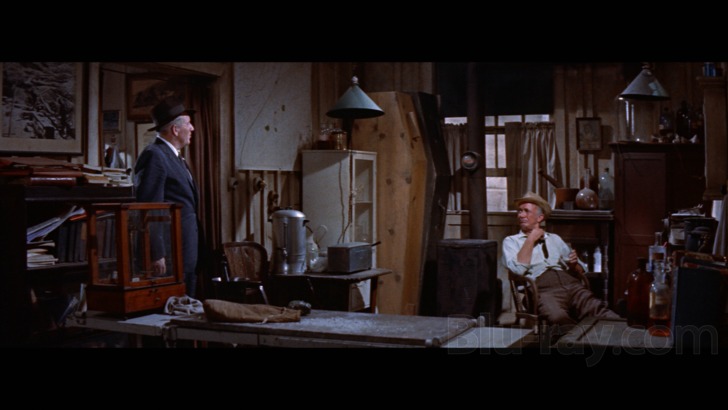
The extras have been ported over from Warner's 2005 DVD release of Bad Day at Black Rock.
- Commentary by Film Professor Dana Polan: For the sake of transparency, I note that Professor Polan and I were graduate school classmates. Since then, he has pursued a distinguished career in teaching and scholarship at the USC School of Cinema-Television and NYU's Tisch School of the Arts. His commentary for Black Rock covers a broad array of topics, with special focus on the film's themes and imagery and its place in director John Sturges' overall filmography. It's a literate and informative presentation, filled with insight and information and without a moment of dead air.
- Trailer (1080p; 2.35:1; 3:26): "What shocking secret did this unwelcome stranger expose at Black Rock?"
Bad Day at Black Rock Blu-ray Movie, Overall Score and Recommendation 

On its own terms, Bad Day at Black Rock is a perfectly realized drama, with efficient exposition
and characters sketched vividly but concisely. Its themes of xenophobia and the hard choice
between what's right and what's expedient still resonate today. As the outsider who becomes the
town's reawakened conscience, John J. Macreedy is a uniquely American hero embodied by one
of cinema's quintessential everymen. WAC's Blu-ray presentation is yet another demonstration of
the format's ability to revitalize cinematic classics. Highest recommendation.
Similar titles
Similar titles you might also like

The Man Who Shot Liberty Valance 4K
1962

Westward the Women
Warner Archive Collection
1951

Run for Cover
Colorado
1955

Duel in the Sun
Roadshow Edition
1946

The Tin Star
Limited Edition
1957

The Ox-Bow Incident
1943

High Noon
4K Restoration
1952

Wagon Master
Warner Archive Collection
1950

Winchester '73
1950

The Fastest Gun Alive
Warner Archive Collection
1956

Ride Lonesome
1959

Two Rode Together
Limited Edition to 3000 - SOLD OUT
1961

Hombre
Limited Edition to 3000 - SOLD OUT
1967

The Defiant Ones
1958

My Darling Clementine
Theatrical and Prerelease Versions
1946

The Three Burials of Melquiades Estrada
2005

Yellow Sky
1948

Navajo Joe
Special Edition
1966

Four Faces West
1948

In a Valley of Violence
2016
